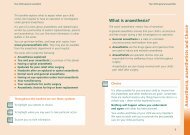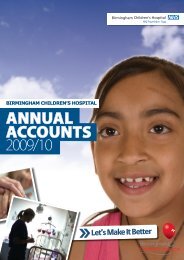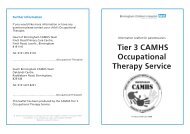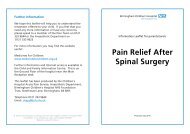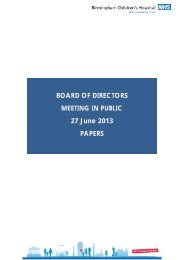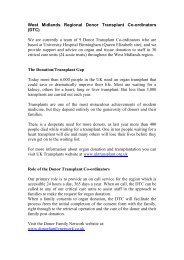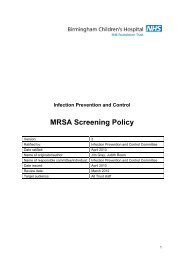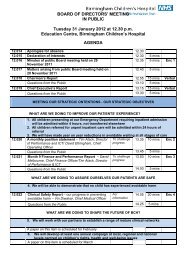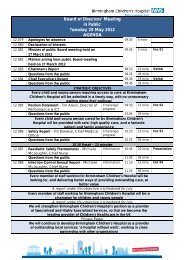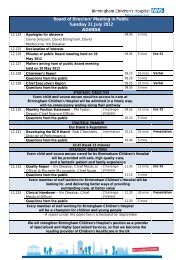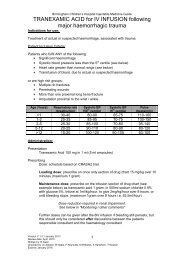Nurses Day! - Birmingham Children's Hospital
Nurses Day! - Birmingham Children's Hospital
Nurses Day! - Birmingham Children's Hospital
You also want an ePaper? Increase the reach of your titles
YUMPU automatically turns print PDFs into web optimized ePapers that Google loves.
SECTION THREE<br />
Our Quality Report<br />
Chief Executive’s Statement on Quality<br />
Our organisation is committed to putting the quality<br />
of care we provide at the centre of everything that<br />
we do. We have ensured that this remains at the<br />
forefront of our agenda by embedding it as the first<br />
of our six strategic objectives.<br />
This commitment is not just about maintaining<br />
the status quo but about continual learning and<br />
improvement. There is no health care organisation<br />
worldwide that can’t in some way improve the<br />
services it provides for its patients and our hospital<br />
is no exception.<br />
During the year our Quality Committee has become<br />
central to this agenda, ensuring that there is a<br />
continual oversight and challenge as to how we<br />
can further improve what we do. This is enhanced<br />
through the work programme of the Board of<br />
Directors - its agenda is structured to focus on<br />
service quality and safety first and foremost. This is<br />
achieved through a range of methods, for example<br />
a detailed quality report is scrutinised, discussed<br />
and debated on a monthly basis. We also use<br />
patient stories and quality walkabouts to ensure<br />
that we look beyond the figures within the report.<br />
We are proud of some of the initiatives and<br />
innovations that have been developed over the past<br />
year to improve quality. We recognise that feedback<br />
from our staff about the services that we provide<br />
and their own experience of working at the Trust<br />
is invaluable in the quality agenda. For example,<br />
we have developed tools to support junior doctors<br />
(Training Advice & Liaison Service) and to capture<br />
their experience of training at the hospital.<br />
Recognising the hard work and commitment of<br />
staff as our most valuable asset is important to the<br />
Trust. We launched a monthly ‘Star of the Month’<br />
award during the last year and some of the stories<br />
of staff working in a diverse range of roles are truly<br />
inspirational. Each year we celebrate the work<br />
of our staff with an annual awards event saying<br />
thank you for their contribution over the past twelve<br />
months.<br />
We have also used technology to improve the<br />
quality of the patient experience. Our App for<br />
Smart Phones allows us to capture the experience<br />
of our patients and their families in real time and<br />
quickly address any issues. All these responses<br />
are captured live on our public website increasing<br />
transparency of the whole process.<br />
We are rightly upheld at a local, regional and<br />
national level for the work that we do on patient<br />
experience. We are proud of the various ways in<br />
which we engage with children and young people<br />
to address how we can improve our services. Our<br />
Young Persons Advisory Group (YPAG) has been<br />
visited most recently by Dr Hilary Cass, president of<br />
the Royal College of Paediatrics and Child Health,<br />
and had input into a range of service areas and<br />
initiatives. For example, the group helped design<br />
a new Dignity Giving Suit to replace the traditional<br />
backless robes used in hospitals.<br />
To the best of my knowledge the information<br />
contained in this Quality Account is accurate.<br />
………………………………………………<br />
David Melbourne, Interim Chief Executive<br />
Priorities for Improvement<br />
At <strong>Birmingham</strong> Children’s <strong>Hospital</strong>, ensuring that we<br />
provide a high quality service is central to everything<br />
we do and this is embedded within our strategy.<br />
We are always looking for ways that we can improve<br />
the quality of our services. This can include making<br />
the experience better for the patients and families<br />
that use our services; changing the way we work so<br />
we can treat every patient that needs or chooses<br />
to come to BCH without any delays; making<br />
things safer than ever before and improving health<br />
outcomes for the diverse range of children and<br />
young people that we see every day.<br />
It is important that we focus our resources on making<br />
improvements where they are needed most, so we<br />
continually monitor and analyse a wide range of<br />
information that tells us where we could do better.<br />
This includes:<br />
l Listening to the children, young people and<br />
families that use our services. There are lots of<br />
ways they can tell us what they think, and<br />
we take account of it all to work out what’s most<br />
important to them:<br />
Complaints, comments and concerns<br />
Feedback cards<br />
Surveys<br />
Patient stories<br />
Feedback App<br />
Websites like NHS Choices and<br />
Patient Opinion<br />
Consultations<br />
Mystery Shoppers<br />
l Listening to our staff. The views of the staff who<br />
work in our hospital every day are vital and we<br />
encourage them to tell us what they think<br />
through surveys, consultations and feedback<br />
events. It’s also really important that we keep an<br />
eye on their happiness and make sure they’re<br />
fully supported so that they are able to deliver<br />
the best services they can.<br />
l Listening to others. The views of BCH groups<br />
like the Young Person Advisory Group help us<br />
focus on how to make the improvements that are<br />
needed.<br />
l Analysing information about the quality of<br />
services, such as patient safety incidents and<br />
clinical audits.<br />
l Using best practice examples, national targets<br />
and learning from and benchmarking with other<br />
organisations.<br />
92 93<br />
BACK TO CONTENTS PAGE<br />
Using this information has helped us to identify<br />
Quality Priorities, which are the main areas we<br />
want to focus on to improve quality. Each priority<br />
has a goal and a way of measuring our progress in<br />
reaching it. These relate to the three elements of<br />
quality: Patient Experience, Clinical Effectiveness,<br />
and Safety. The priorities we are reporting on this<br />
year are:<br />
In 2013/14 we will also report on some additional<br />
priorities that we have been developing during<br />
2012/13:<br />
Safety:<br />
Patient Experience:<br />
Patient Experience<br />
Emergency Department Transfers<br />
Staff Survey<br />
Food and Nutrition<br />
Tertiary Inpatient Referrals<br />
Play and Activities<br />
Cancelled Operations<br />
Clinical Effectiveness<br />
Nursing Care Quality Indicators<br />
CAMH Service User Satisfaction<br />
Asthma Care<br />
Health Promotion<br />
Safety<br />
Pressure Ulcers<br />
Preventing MRSA<br />
Reducing Acute Life Threatening Events, and<br />
Cardiac and Respiratory Arrests<br />
Reducing Healthcare Acquired Infections in PICU<br />
Reducing MSSA<br />
Zero Avoidable Deaths Reducing rates of<br />
Clostridium Difficile<br />
Reducing Medication Incidents Resulting in Harm<br />
WHO Safe Surgery Checklist Completion<br />
Extravasation Injuries<br />
Friends and Family test<br />
(for children and young<br />
people)<br />
Clinical Effectiveness: Implementing the Sepsis<br />
Care Bundle<br />
These priorities and what we’ve achieved in<br />
2012/13 are set out over the next few pages of this<br />
Quality Account.



